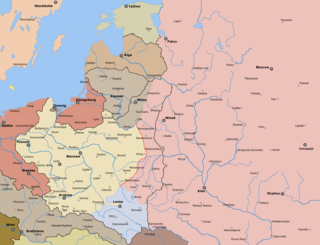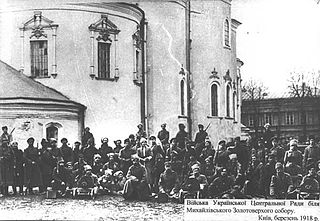 W
WThe Battle of Kruty took place on January 29 or 30, 1918, near Kruty railway station, about 130 kilometres (81 mi) northeast of Kyiv, Ukraine, which at the time was part of Nezhinsky Uyezd of Chernigov Governorate.
 W
WThe Battle of Lemberg took place from November 1918 to May 1919 and was a six-month long conflict in what is modern-day Ukraine. The battle was fought between attacking forces of the West Ukrainian People's Republic and the local Polish civilian population, assisted later by regular Polish Army forces for the control over the city of Lviv, in what was then eastern part of Galicia and now is western part of Ukraine. The battle sparked the Polish-Ukrainian War, ultimately won by Poland.
 W
WThe Battle of Motovilivka was a military engagement fought between forces of the Ukrainian State and the Directorate of Ukraine. The battle took place on 18 November 1918 during the Ukrainian Civil War, and resulted in a major victory for the Directorate. The battle resulted in the eventual collapse of the Ukrainian State in December 1918.
 W
WThe Treaty of Brest-Litovsk was a separate peace treaty signed on March 3, 1918, between the new Bolshevik government of Russia and the Central Powers, that ended Russia's participation in World War I. The treaty was signed at German-controlled Brest-Litovsk, after two months of negotiations. The treaty was agreed upon by the Russians to stop the further invasion. According to the treaty, Soviet Russia defaulted on all of Imperial Russia's commitments to the Allies and eleven nations became independent in Eastern Europe and western Asia.
 W
WThe Donetsk–Krivoy Rog Soviet Republic or Donetsk–Kryvyi Rih Soviet Republic was a self-declared Soviet republic of the Russian SFSR founded on 12 February 1918. It was founded three days after the government of Ukraine signed the treaty with the Germans, which recognised the borders of the Ukrainian People's Republic. The republic was never viewed as a separate entity by anyone except for members of the self proclaimed republic. The interest in the republic and its autonomous status was revived with the appearance of the Ukrainian political party Donetsk Republic in 2005 led by Andrei Purgin.
 W
WThe Fourth Universal of the Ukrainian Central Council is a legal document that declared full state independence of Ukrainian People's Republic. It was adopted by the Little Council (Committee) of the Ukrainian Central Council in Kiev on 22 January [O.S. 9 January] 1918. Its appearance, in particular, was preceded by the start of peace negotiations of Ukrainian People's Republic with the Central powers in Brest-Litovsk.
 W
WThe General Secretariat of Ukraine was the autonomous Ukrainian executive government of the Russian Republic from June 28, 1917 to January 22, 1918. For most of its existence it was headed by Volodymyr Vynnychenko.
 W
WBattle of Kaniv, or Battle of Kaniów took place during World War I on the night of 10–11 May 1918, near Kaniv, Ukraine between Polish and German army troops. The fighting pitted the Polish II Corps in Russia, under General Józef Haller von Hallenburg, against the German Imperial Army, under General Franz Hermann Zierold. Ultimately the Germans were victorious with about half of the Polish forces surrendering and the rest retreating in disarray.
 W
WKiev Arsenal January Uprising, sometimes called simply the January Uprising or the January Rebellion, was the Bolshevik organized workers' armed revolt that started on January 29, 1918 at the Arsenal factory in a Kiev (Kyiv) during the Ukrainian-Soviet War. The goal of the uprising was to sabotage the ongoing elections to the Ukrainian Constituent Assembly and to support the advancing Red Army.
 W
WThe Lwów pogrom was a pogrom perpetrated by Polish soldiers and civilians against the Jewish population of the city of Lwów. It happened on 21–23 November 1918, during the Polish–Ukrainian War that followed World War I.
 W
WThe Odessa Bolshevik uprising was a Bolshevik-led uprising of workers and sailors allied with approaching Red Guards forces of Soviet Russia.
 W
WThe Odessa Soviet Republic was a short-lived Soviet republic formed on 30 January [O.S. 17 January] 1918 from parts of the Kherson and Bessarabia Governorates of the former Russian Empire.
 W
WThe Polish–Ukrainian War of November 1918 and 1919 was a conflict between the Second Polish Republic and Ukrainian forces. The conflict had its roots in ethnic, cultural and political differences between the Polish and Ukrainian populations living in the region. The war started in Eastern Galicia after the dissolution of the Austro-Hungarian Empire and spilled over into Chełm Land and Volhynia (Wołyń) regions formerly belonging to the Russian Empire, which were both claimed by the Ukrainian State and the Ukrainian People's Republic.
 W
WThe Romanian military intervention in Bessarabia took place between 19 January and 8 March 1918, as part of the broader Allied intervention in the Russian Civil War. It pitted the Kingdom of Romania, Russian Republic, Ukrainian People's Republic and anti-Bolshevik factions of the Moldavian Democratic Republic on one side, against the Bolshevik controlled Rumcherod and Odessa Soviet Republic, as well as pro-Bolshevik factions within the Moldavian DR. The intervention began when the Romanian army and its allies crossed into Bessarabia and launched an attack on Chișinău and Ungheni, capturing the latter.
 W
WThe Taurida Soviet Socialist Republic was an unsuccessful attempt to establish a Soviet republic situated in the Crimean Peninsula part of Soviet Russia. The republic was established by Bolshevik Anton Slutsky who previously participated in the Petrograd Bolshevik revolution.
 W
WThe West Ukrainian People's Republic (WUPR), or West Ukrainian National Republic (WUNR), was a short-lived republic that existed from November 1918 to July 1919 in eastern Galicia. It included the cities of Lviv, Przemyśl, Ternopil, Kolomyia, Boryslav and Stanislaviv, and claimed parts of Bukovina and Carpathian Ruthenia. Politically, the Ukrainian National Democratic Party dominated the legislative assembly, guided by varying degrees of Greek Catholic, liberal and socialist ideology. Other parties represented included the Ukrainian Radical Party and the Christian Social Party.
 W
WThe Ukrainian People's Republic of Soviets (1917–1918) was a short-lived Soviet republic of the Russian SFSR that was created by the declaration of the Kharkiv All-Ukrainian Congress of Soviets "About the self-determination of Ukraine" on 25 December [O.S. 12 December] 1917 in the Noble Assembly building in Kharkiv. The republic was later united into the Ukrainian Soviet Republic and, eventually, liquidated, because of a cessation of support from the government of the Russian SFSR when the Treaty of Brest-Litovsk was signed.
 W
WThe Ukrainian Soviet Republic was one of the names of the earlier Soviet Ukrainian quasi-state formations, a pro-Bolshevik Soviet government that resided in Kharkiv.
 W
WThe Ukrainian State, sometimes also called the Hetmanate, was an anti-socialist government that existed on most of the modern territory of Ukraine from 29 April to 14 December 1918.
 W
WThe Civil War in Ukraine is the term commonly used in post-Soviet Ukraine for the events taking place between 1917–21, nowadays regarded essentially as a war between the Ukrainian People's Republic and the bolsheviks. The war ensued soon after the October Revolution when Lenin dispatched the Antonov's expeditionary group to Ukraine and Southern Russia.